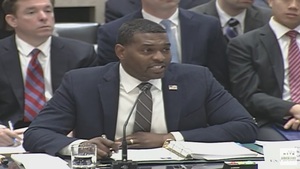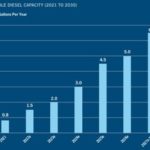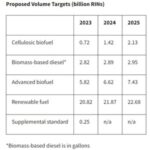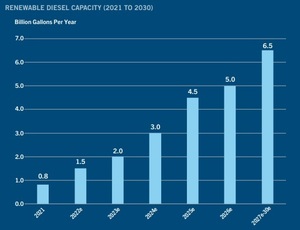Regan discusses E15 waivers, biomass-based diesel RVOs at hearing
Energy Disrupter
ADVERTISEMENT
Members of the House Agriculture Committee grilled U.S. EPA Administrator Michael Regan on the agency’s low proposed Renewable Fuel Standard renewable volume obligations (RVOs) for biomass-based diesel, delays in implementing year-round E15 waivers, and greenhouse gas (GHG) tailpipe emission standards during an April 19 hearing.
Numerous lawmakers, including Reps. Mike Bost, R-Ill.; Dusty Johnson, R-S.D.; Tracey Mann, R-Kan.; Randy Feenstra, R-Iowa; Zach Nunn, R-Iowa; and Angie Craig, D-Minn., pressed Regan on delays associated the year-round E15 petitions submitted by eight Midwest governors and the potential for a nationwide emergency waiver allowing E15 to be sold during the summer 2023 driving season.
Regan said his agency has taken the waiver requests filed by the eight Midwest governors very seriously but was unable to ramp up the rulemaking in time to implement a rule ahead of the 2023 summer driving season. He cited concerns over “a significant disruption in consumer pricing” if the EPA moves too quickly as one reason the agency has proposed to delay the effective date of those waivers from summer 2023 to summer 2024. He also noted that the EPA feels confident that the rulemaking will be complete in time for the summer 2024 driving season.
When asked by Johnson about legislative efforts to allow year-round E15 nationwide and whether he believed that allowing year-round sales of E15 would be good policy, Regan said he couldn’t speak to the policy aspects of the question. He did note, however, that the EPA would like to provide technical assistance to any legislative efforts to allow year-round sales of E15. He said that technical analysis and modeling done as part of the Midwest E15 petition would also have to be completed for other states as part of the agency’s implementation of a legislative E15 fix. Similarly, Regan said that any additional states that choose to join the eight Midwestern states in allowing year-round sales of E15 would likely be subject to a rulemaking process similar to the one currently in progress.
During his testimony, Regan also provided some background on the EPA’s caution in moving too quickly with regard to E15 waivers. Specifically, he cited the example of the previous administration’s efforts to implement a year-round E15 waiver that was unable to hold up to a court challenges.
Regarding the potential for an emergency E15 waiver for the summer 2023 driving season, Regan indicated that no decision has yet been made. He repeatedly said that his staff is continually monitoring the situation. To date, however, EPA staff has been unable bring him the level of evidence that he needs to issue an emergency waiver. He explained that the regulatory setting for issuing an emergency waiver is very prescribed. Conditions on the ground at a certain time must meet certain thresholds he said. While many of the factors that made the issuance of an emergency waiver appropriate last year are still in place, Regan indicated that the threshold is not yet high enough to issue the waiver. His testimony implied that some factors identified last year by the U.S. Department of Energy that were integral to issuing the waiver are not currently being identified by that agency. As the summer driving season quickly approaches, however, he also stressed that no options have been taken off the table and the EPA is continuing to work with the DOE and other necessary parties and will issue an emergency waiver if and when the proper conditions are identified.
While Regan was unable to offer any assurances regarding the E15 emergency waiver, his testimony seemed to indicate that the EPA may take more favorable action with regard to pending biomass-based diesel RVOs. Reps. David Scott, D-Ga., Bost and Craig were among the lawmakers that pressed Regan on the low proposed RVOs for biomass-based diesel in the pending RFS “set” rule, which is expected to set RVOs for 2023, 2024 and 2025.
Regan said the EPA has received a lot of new data regarding biomass-based diesel production capabilities as part of the RVO rulemaking’s comment period. “I can assure you that we’ve met with a number of stakeholders that have offered us a lot of new data, and we believe that will be reflected in the final rule,” he said. He added that the agency is going to “make adjustments based on [public comments] and come out with a very strong final rule.”
Regan also responded to a range of criticism over the EPA’s recently released tailpipe GHG emissions standards. That criticism focuses on the agency’s decision not to consider the role of biofuels as a tool to reduce tailpipe emissions within that proposed rule. Regan said the agency doesn’t see that rule as alienating agricultural or rural communities. Rather, he said the agency is working to implement complimentary policies that will help drive us to a low carbon future. “We see a tremendous market for biofuels that is complementary to the EV fuels future,” he said.
In particular, Regan repeatedly stressed the EPA’s support for biobased sustainable aviation fuels (SAF). He discussed his work on a task force focused on SAF, noting that the EPA is engaging with the U.S. Department of Treasury, DOE, USDA and other task force members to consider the role of biofuels in aviation.
A full replay of the hearing is available on the House Agricultural Committee website.
















